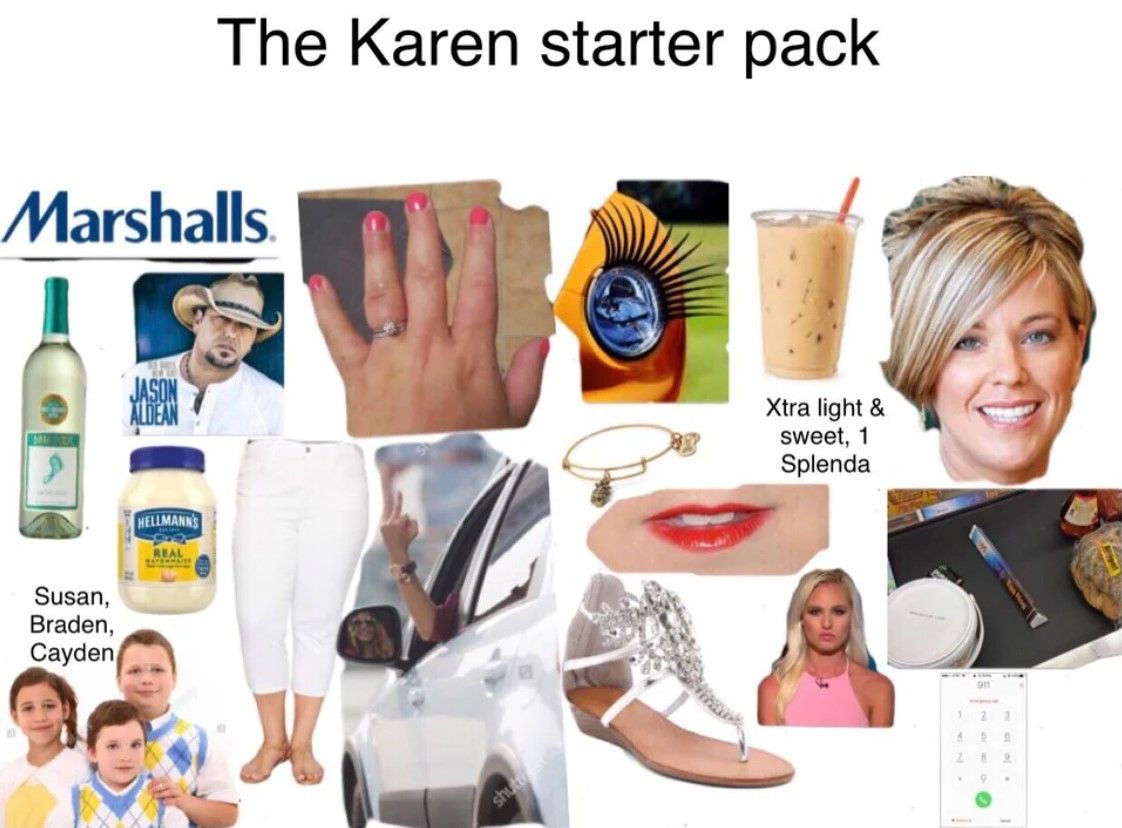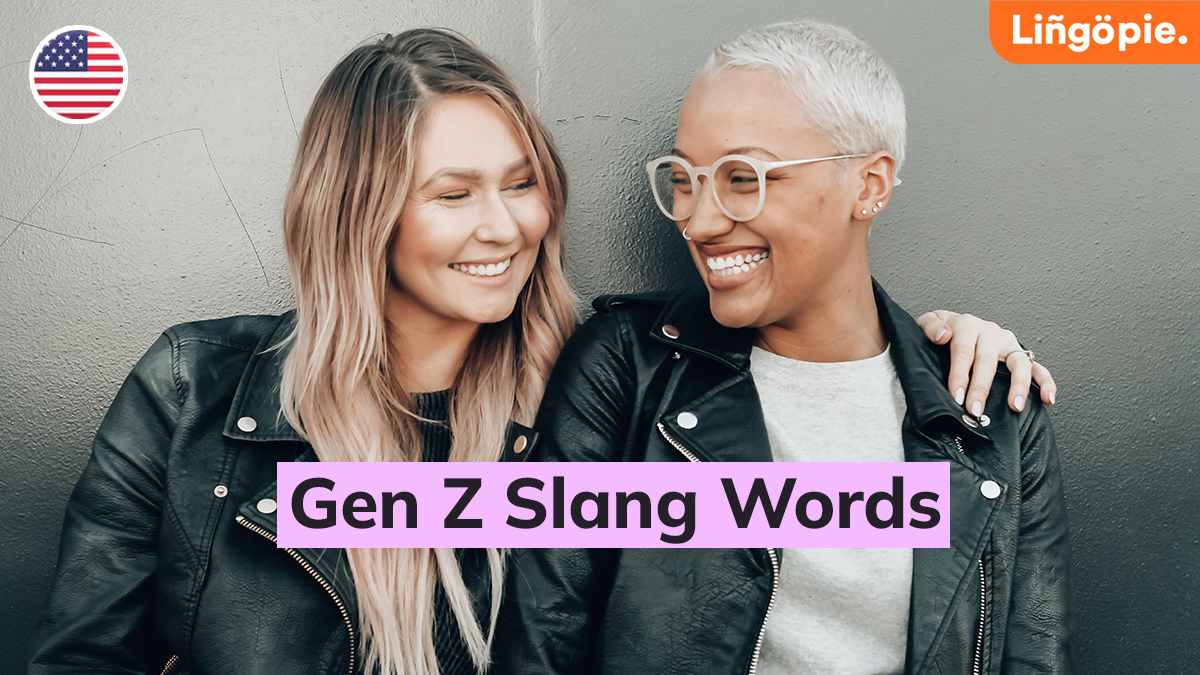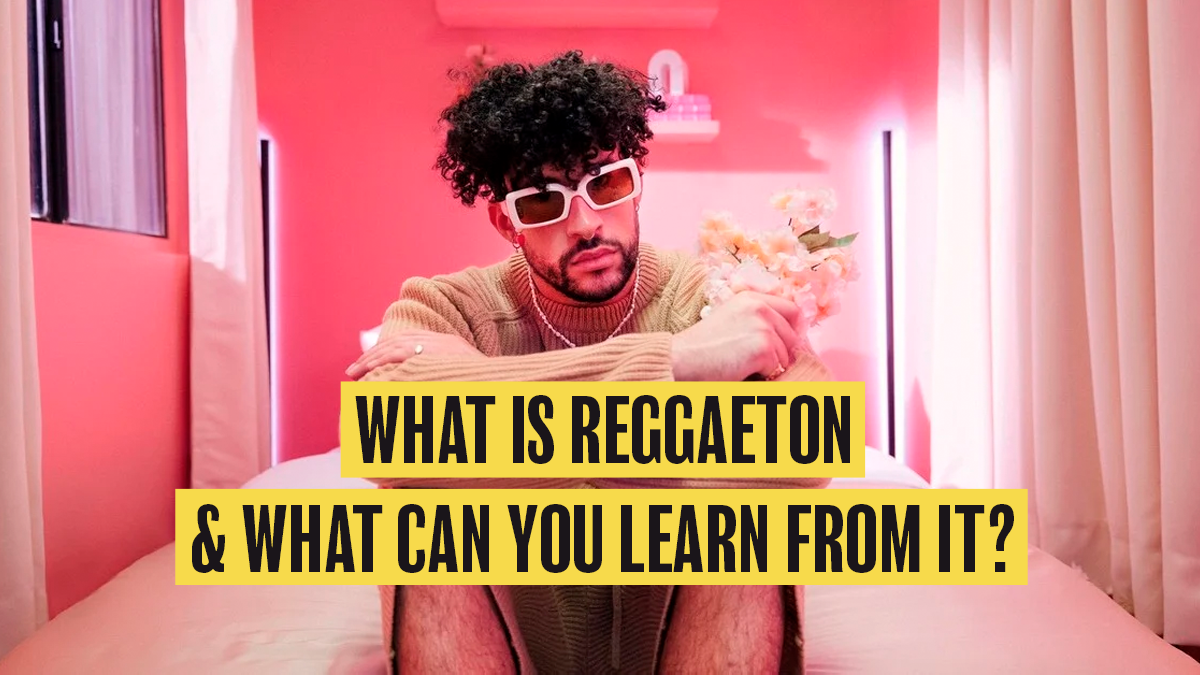With all the grammar changes and conditional tenses, learning English formalities can be difficult enough. But what about the informalities? Scrolling through social media introduces you to a whole new collection of vocabulary with phrases like ‘I’m weak’, ‘fire’ and ‘goat’ that have nothing to do with the content of the post they’ve been commented on - nor the conversations that they appear in irl (‘in real life’)!
But have no fear… since Lingopie is officially giving you the option to learn English on their platform through TV and movies, we’re also going to teach you all about the latest Gen Z slang words.
So, If you’re planning to study abroad, become fluent in English, or make friends with native speakers, it’s compulsory to understand the latest acronyms, coined terms and slang collocations.

Who is Gen Z?
‘Gen Z’ is an abbreviation of the noun ‘Generation Z’, the term used for people born between 1996 and 2010. People born before Gen Z but after 1981 are called ‘Millenials’, who were important for laying the groundwork to some of the latest trends we use today.
Below is a list of current popular slang words and a unique description of their etymology!

Bruh
How did it come about? ‘Bruh’ is a phonetically spelled version of the Millenial term ‘bro’ (short for ‘brother’). Colloquially, the term ‘brother’ or ‘bro’ was used to refer to a close friend (EG: “Hey bro, what’s up?” or “I love him, he’s my bro.”) But over time, the usage of the word ‘bro’ began to be used to express politeness and familiarity with both friends and strangers (EG: “Can we have a table for two please, bro?”)
With this increased usage, the ‘O’ became a lazy ‘Uh’ sound and ‘ye bruh’-‘nah bruh’ was formed. People began to use the term online when expressing opinions, calling the audience ‘bruh’, until eventually, the word ‘bruh’ became a whole sentence suggesting disbelief, disgust, amazement or shock.
Example usage:
Dude 1: Bruh, ngl (‘not gonna lie’) I love Shawn Mendes
Dude 2: …
Dude 2: bruh
smh
How did it come about? Non-verbal communication is just as important as verbal communication in the English speaking culture. ‘Shaking your head’ can either mean very simply saying ‘no’ by moving your head from left to right, or hanging your head with your chin close to your neck and slowly shaking it. This means ‘oh no’ or ‘how embarrassing’ or ‘I have no words for how bad that is’. You might even bury your face in your hands which used to be known as ‘facepalm’. But now we say ‘smh’ which stands for ‘shaking my head’.
Today, even in person, people say “Shaking my head” instead of actually shaking their head, or they might even say the letters “Ess-emm-aitch.”
Example usage:
Dude 2: He told me he loves Shawn Mendes
Dude 3: smh

Karen
How did it come about? From 1938 until 1979, ‘Karen’ was one of the most popular names given to newborn girls in the UK and US. So circa 2020, those babies were 40ish year old women, making it stereotypically hilarious when people started to tweet jokes about shouty, ignorant, privileged women and call them Karen. For example: “We won’t be turning the disabled parking spots into regular parking spots just so that you can use them, but thanks for your input, Karen.”
Now, the proper noun ‘Karen’ has turned into an adjective and become everyone’s favourite insult any time an older white woman complains or says something racist, insensitive, childish or wants to talk to the manager.
Example usage:
Mum: This food doesn’t taste very nice, I want to talk to the manager
Daughter: No, mum, please, don’t be such a karen
Karen starter pack:

Finna
How did it come about? Most people don’t know that according to dictionary.com, ‘finna’ is a grammatically correct feature of African American English vocabulary. Back in the 1700s, people would use finna to mean ‘fixing to’, like ‘[I] intend to’ or ‘[I’m] getting ready to.’ In the 21st century, with the internet and social media providing a platform for Black culture to reign, ‘finna’ was adopted by the youth and used in tweets as a replacement of ‘[I’m] going to’ or ‘[I’m] about to’. It does not mean ‘[I’ve] got to’ or ‘[I] have to’!
Although seen all over Tik Tok and Twitter today, unless you’re part of African American speech communities, it’s not recommended to use this word irl. You will be ridiculed, especially if you get the context wrong…
Example usage:
Tweet from a hip-hop artist: This next album finna blow
(The album is about to/going to be very successful)
goat [GOAT or G.O.A.T]
How did it come about? Quite far from the shaggy-haired farm animal, GOAT stands for ‘Greatest Of All Time’ and was originally used to highly commend someone in a particular field of sport. This acronym was first used in 1992 when Mohammed Ali’s wife, Lonnie, established ‘G.O.A.T Inc’, a company for former boxers. In 2000, American rapper LL Cool J released an album called “G.O.A.T (The Greatest of All Time)” which began to popularise the phrase. Fast-forward 22 years, and the term ‘goat’ is used generally and loosely about anyone for anything.
Example usage 1:
Dude 1: I love your mum, she’s a goat
Example usage 2:
A comment on a selfie posted on instagram: GOAT 🔥🔥🔥

Fire
How did it come about? Millennials popularised the word ‘hot’ to describe someone as ‘attractive’ or ‘sexy’ (the usage of which goes all the way back to the 1880s). Then when Gen Z started to use the Millennial term on social media, the word ‘hot’ got replaced with the fire emoji, which also meant ‘lit’ (like the past tense of ‘to light’) and eventually the literal annotation ‘fire’.
Now ‘fire’ can be used as a compliment for anything that’s ‘really good’, ‘super cool’, ‘good-looking’ or ‘impressive’.
Example usage 1:
Friend 1: That girl’s t-shirt is so fire
Friend 2: Her music is fire too
Slaps
How did it come about? The word ‘slap’, usually meaning ‘to hit with an open hand’ became a popular term used to describe how ‘excellent’ or ‘awesome’ a song is if it has a heavy bass. This probably came from the noun ‘slap bass’ which is a technique used to play bass instruments. Over time, as it sailed across the internet, ‘This slaps!’ became a compliment, not just for a song with an intense bassline, but for any song, item or object that was considered to be very well made.
Example usage 1:
This Taylor Swift song slaps hard
Example usage 2:
This ice cream slaps!
I’m weak
How did it come about? Similarly to ‘shaking my head’, this slang term originates from a function of the physical body. When something makes you laugh hysterically, you begin to lose control of your muscles as they weaken with the intense emotion. And so, apparently originating in New York, the phrase ‘I’m weak’ is used to express that something is very funny, entertaining or amusing. Alternatively, you could also say ‘I’m dead’ which comes from the same understanding. (We also use an idiom in English - ‘laugh ‘til you drop!’)
Example usage 1:
A comment on a funny instagram video: I’m weak!
af
How did it come about? Don’t worry, ‘af’ is not an English preposition that you’ve forgotten about. ‘Af’ is an acronym for ‘as f*ck* which has become a whole new word of its own. Famously, the word ‘f*ck’ is the most versatile word in the English language and can be used as a noun, verb, adverb, adjective and so on. ‘As f*ck’ is used to emphasise or exaggerate an opinion or statement, and so the shorthand ‘af’ is now used both online and in person.
Online, you can also see it spelt ‘afff’ or ‘asf’ and in person, it can be pronounced as one word, “Asfuh” (rhymes with ‘bruh’!) or as the letters, “Ayy-eff” (which is very Millennial, so don’t do that).
Example usage 1:
Bruh the new Lindsey Lohan movie finna be fire af

Living rent free
How did it come about? As you may already know, ‘rent’ is the payment given to a landlord so that you can live in a house or temporarily own something. (EG: You can ‘rent a bike’ or ‘rent a music studio.’) But if you’re staying somewhere without paying money, you would say “I’m living [there] rent free.”
As the inflation of housing prices remains culturally significant, Gen Z kids took pride and gratitude in being able to say “I’m living [in a place] rent free”, until their funny and creative minds began to use it as a popular phrase for memes that get stuck in your head… So fast forward to the age of the Gen Z internet-take-over, and now you can find people saying that cringey, heart-warming or catchy memes are “Living in my head rent free.”
Example usage:
Girl 1: Man, I can’t get the lyrics to that new Rihanna song out of my head
Girl 2: Yo, same! (me neither) They are living rent free!
There’s plenty more where that came from and Lingopie is here to teach you all of it. So stay tuned if you want to dramatically increase your English level, and learn more of the words you thought you knew.






![Improve Your English Listening Comprehension [2025 Guide]](/blog/content/images/size/w300/2023/12/5D8A320F-7EF3-4F0F-9EDD-0F91C9504FA0.png)
![4 Hacks to Learn English With Movies [2025 Guide]](/blog/content/images/size/w300/2023/10/88AAD01A-8BF3-4648-82CC-639C1B240C28.png)

![How To Learn English With Sitcoms: 5 Easy Ways [Guide]](/blog/content/images/size/w300/2023/09/94E050B7-BD8B-4659-B6E5-B5996E461FC8.png)